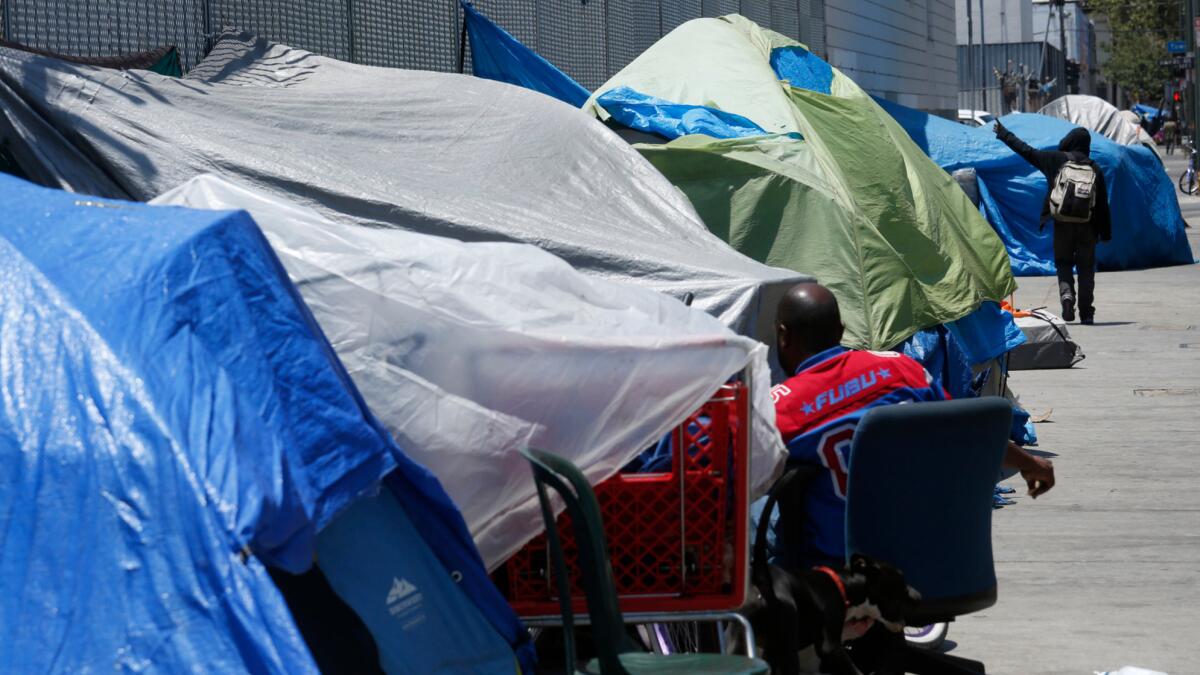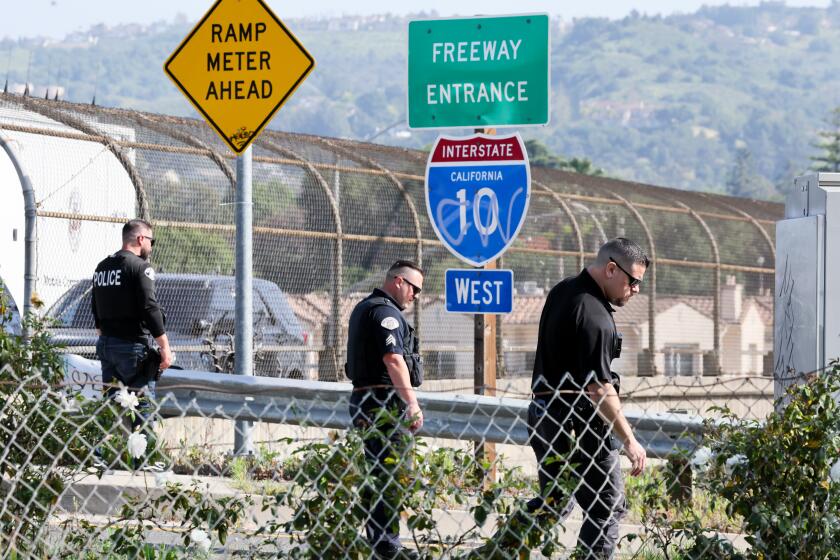If L.A. OKs a $1.2-billion bond for homeless initiatives, the city will need to up its real estate game

Nearly eight years ago, Los Angeles County’s transit agency embarked on a huge construction initiative aimed at adding new subway lines, freeway lanes and light rail routes.
Before that, the Los Angeles Unified School District took on a massive plan for building dozens of elementary, middle and high schools.
Now, political leaders at Los Angeles City Hall are looking to persuade voters to approve a $1.2-billion property tax increase to pay for initiatives to help and house the homeless. If the bond measure passes, the city will find itself responsible for its own sprawling construction initiative -- this one focused on home-building for the city’s neediest residents.
With a bond measure, the city will have to develop “a housing machine that has a single purpose and focus,” said City Administrative Officer Miguel Santana, who advises Mayor Eric Garcetti and the City Council. “And that focus is to build at a massive scale.”
The measure, headed for the Nov. 8 ballot, would generate considerably less money than the programs run by Metro and L.A. Unified. But it would thrust the city into the real estate business in similar ways.
Under state and federal law, proceeds from a bond measure must go toward “bricks and mortar” facilities, Santana said. The city is currently required to own the land where the bond-funded housing is built, he said.
There’s plenty of land available in areas where NIMBYism won’t come into play.
— Mark Tarczynski, an executive vice president with Colliers International
As a result, officials are preparing for the possibility of acquiring hundreds of parcels, from nuisance motels to underused parking lots, over a decade. Those sites would then be rented for $1 a year to groups that develop permanent supportive housing – subsidized apartments that offer substance-abuse counseling, mental health services or other on-site resources.
“What we don’t want to do is build more government-owned public housing,” Councilman Jose Huizar said. “That’s why we will work with the private sector. But given that the bond measure will require us to own the property, we could perhaps do long-term leases and get creative in other ways.”
The strategy could leave city officials facing the same obstacles that have bedeviled private real estate developers for years.
Among those challenges are outdated zoning, requirements for multiple planning department approvals, opposition from neighbors and possibly legal challenges based on the state’s environmental laws, said Carol Schatz, chief executive of the downtown-based Central City Assn., which focuses on real estate development.
For that reason, the city will need to work closely with organizations that are seasoned in the construction of homeless housing, said Schatz, whose group supports the bond measure.
“It would be hard for an entity without development experience to walk into this scenario and be able to build a new project in a timely manner,” she said.
A bond program could raise other thorny policy questions. Should the city acquire a site if it would mean demolishing rent-controlled apartments? Should a housing project be placed next to freeways, where land is frequently cheaper? Or should the city avoid such locations out of concern for health effects from vehicle emissions?
If city leaders attempt to acquire properties near skid row, where significant numbers of homeless people live on sidewalks, they will face the high prices of the downtown real estate market, said Derrick Moore, principal of the retail properties group at the firm Avison Young. But if they look for land in the suburbs, there is a greater likelihood they will face neighborhood resistance, Moore said.
Mark Tarczynski, an executive vice president with the real estate company Colliers International, offered a more upbeat take, saying Los Angeles has more than enough properties that could be easily acquired and where residents would support housing for the homeless.
“There’s plenty of land available in areas where NIMBYism won’t come into play,” he said.
Santana said his office is already looking to improve the city’s process for approving housing developments. And he maintained that every part of the city would have to do its part in accommodating homeless facilities.
“We ultimately are all part of the solution,” he said.
If the bond measure passes, developers of homeless housing will, in many cases, simply identify sites and recommend them to the city for purchase, said Stephanie Klasky-Gamer, president of L.A. Family Housing, which owns 375 units of permanent supportive housing.
Klasky-Gamer doesn’t expect much will change at City Hall under a bond program. Because city officials already provide funds for subsidized housing projects, they have long been tackling the big questions about where and how those developments should be built, she said.
“This just increases the volume, which is what has to happen if we’re going to make a significant dent in ending homelessness,” Klasky-Gamer said. “We need to do something to change the pace.”
City leaders are also holding out hope that they will be permitted to use the bond proceeds to provide direct loans and grants to developers of homeless housing. At this point, that arrangement has not received legal clearance from the city’s bond counsel, Santana said.
The council may go to court to obtain a judge’s permission to send bond funds directly to housing developers – a process that could take six months to a year. But seeking a judge’s approval could also leave the city open to a legal challenge from groups opposed to the use of bond funds, city analysts say.
As it acquires properties, the city would also have one tool available that private developers lack: the power of eminent domain – that is, the legal right to force an owner to sell. That power already exists when the city obtains land for new fire stations, police stations and other facilities.
Councilman Mitch O’Farrell said the city should make a commitment to not use eminent domain as part of the bond program. The very prospect of eminent domain, he said, could hurt the measure’s chances of passage among homeowners and businesses.
“The term scares our constituents,” said O’Farrell, who represents neighborhoods from Echo Park to Hollywood.
Santana, the high-ranking city analyst, said it is “highly unlikely” the city would use eminent domain as part of its bond program.
“It’s always our last resort,” he said.
ALSO
L.A. area congressman target of new anti-Trump ad campaign
He took part in the student walkouts a decade ago. Now he teaches young people to take a stand
How to remake the L.A. freeway for a new era? A daring proposal from architect Michael Maltzan
Twitter: @DavidZahniser
More to Read
Start your day right
Sign up for Essential California for news, features and recommendations from the L.A. Times and beyond in your inbox six days a week.
You may occasionally receive promotional content from the Los Angeles Times.






